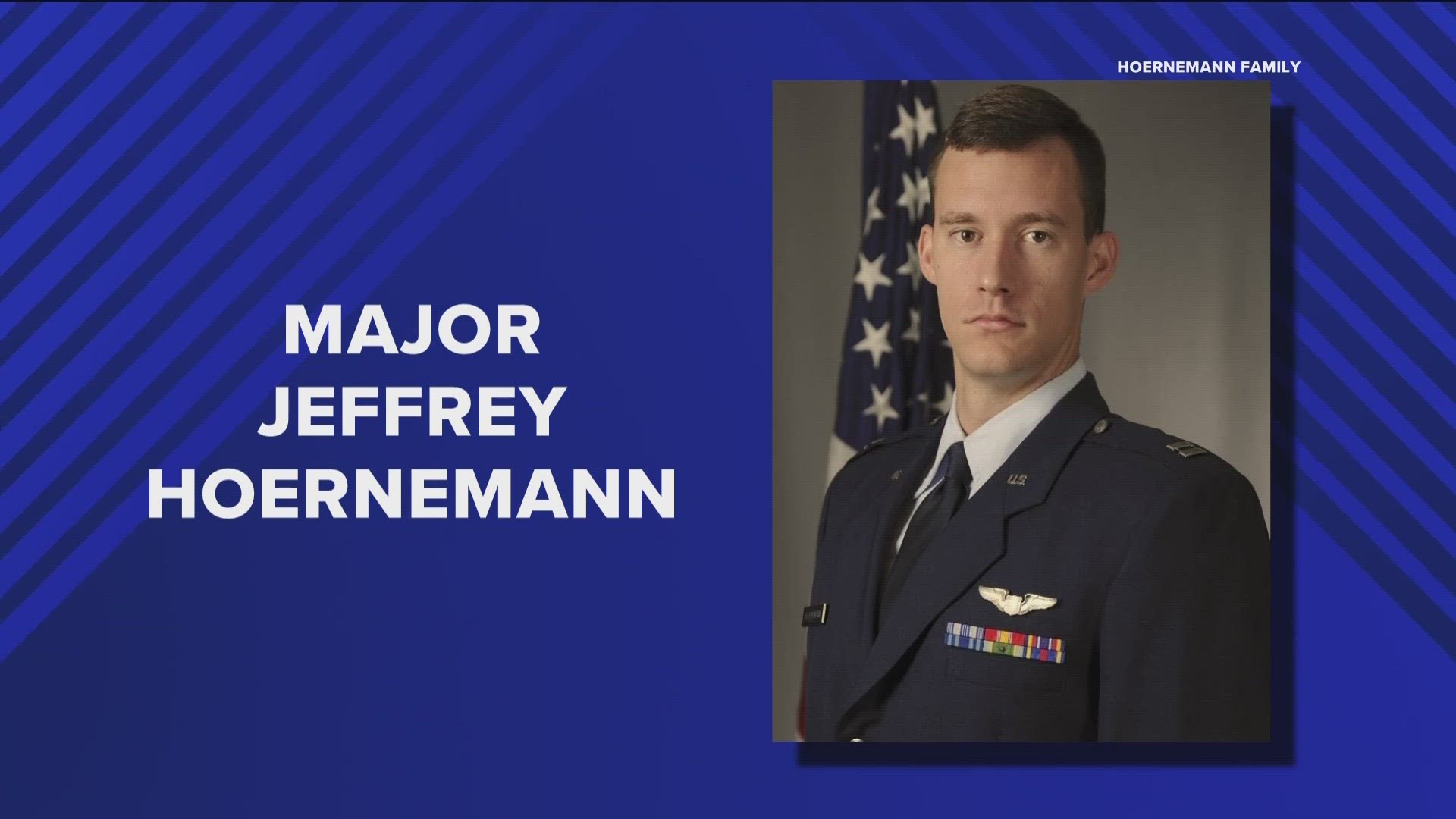WASHINGTON — An airman from Andover, Minnesota has been identified among the eight U.S. Air Force crew members lost in a CV-22 Osprey crash off the coast of Japan last week.
An Air Force news release identifies Maj. Jeffrey T. Hoernemann, 32, of Andover, among the Airmen now classified as deceased following the Nov. 29 crash during a training mission near Yakushima, Japan. The Air Force said Hoernemann served as a CV-22 instructor pilot and officer in charge of training, assigned to the 21st Special Operations Squadron, 353rd Special Operations Wing, at Yokota Air Base in Japan.
“We are grief-stricken and mourning over Jeff’s passing," Hoernemann's family said in a statement. "Our hearts are shattered along with families of the other crew members and we mourn their loss as well. They were the best of the best."
On Monday, the Air Force said six of the eight crew members' remains had been located. Three of those have been recovered. The two lost crew members were unlikely to have survived and the search for their remains was continuing, the Air Force said Tuesday.
“Our thoughts and prayers are with the families, friends and peers of all who are impacted by this mishap and loss of life,” said Lt. Gen. Tony Bauernfeind, Air Force Special Operations Command commander, in a statement. “In times like these, where service to our nation is not just a personal commitment but also a legacy woven into the fabric of our families, the depth of sorrow is immeasurable. The honorable service of these eight Airmen to this great Nation will never be forgotten, as they are now among the giants who shape our history.”
The full list of lost crew members announced by the Air Force include:
- U.S. Air Force Maj. Jeffrey T. Hoernemann, 32, of Andover, Minnesota, was a CV-22 instructor pilot and officer in charge of training, assigned to the 21st Special Operations Squadron, 353rd Special Operations Wing, Yokota Air Base, Japan.
- U.S. Air Force Maj. Eric V. Spendlove, 36, of St. George, Utah, was a residency trained flight surgeon and medical operations flight commander assigned to the 1st Special Operations Squadron, 353rd Special Operations Wing, Kadena Air Base, Japan.
- U.S. Air Force Maj. Luke A. Unrath, 34, of Riverside, California, was a CV-22 pilot and flight commander assigned to the 21st Special Operations Squadron, 353rd Special Operations Wing, Yokota Air Base, Japan.
- U.S. Air Force Capt. Terrell K. Brayman, 32, of Pittsford, New York, was a CV-22 pilot and flight commander assigned to the 21st Special Operations Squadron, 353rd Special Operations Wing, Yokota Air Base, Japan.
- U.S. Air Force Tech. Sgt. Zachary E. Lavoy, 33, of Oviedo, Florida, was a medical operations flight chief assigned to the 1st Special Operations Squadron, 353rd Special Operations Wing, Kadena Air Base, Japan.
- U.S. Air Force Staff Sgt. Jake M. Turnage, 25, of Kennesaw, Georgia, was a flight engineer assigned to the 21st Special Operations Squadron, 353rd Special Operations Wing, Yokota Air Base, Japan.
- U.S. Air Force Senior Airman Brian K. Johnson, 32, of Reynoldsburg, Ohio, was a flight engineer assigned to the 21st Special Operations Squadron, 353rd Special Operations Wing, Yokota Air Base, Japan.
- U.S. Air Force Staff Sgt. Jacob “Jake” M. Galliher, 24, was a native of Pittsfield, Mass. His remains were the first to be found.
The U.S.-made Osprey is a hybrid aircraft that takes off and lands like a helicopter but can rotate its propellers forward and cruise much faster, like an airplane, during flight. The CV-22B Osprey that Hoernemann was in crashed on Nov. 29 during a training mission. Ospreys have had a number of crashes, including in Japan, where they are used at U.S. and Japanese military bases, and the latest has rekindled safety concerns.
Japan has suspended all flights of its own fleet of 14 Ospreys. Japanese officials say they have asked the U.S. military to resume Osprey flights only after ensuring their safety. The Pentagon said no such formal request has been made and that the U.S. military is continuing to fly 24 MV-22s, the Marine version of Ospreys, deployed on the southern Japanese island of Okinawa.
In Tokyo, Defense Ministry Press Secretary Akira Mogi said Tuesday that deployment of Ospreys is key to a defense buildup in southwestern Japan due to current regional security concerns but acknowledged the need to address the residents' safety worries rekindled by the crash.
Mogi said Japanese defense officials are examining information shared by the U.S. to determine if the U.S. military responses are adequate, but he added that the shared information so far is insufficient. “We need further explanation, information and a process to verify that," he said.
On Sunday, pieces of wreckage that Japan’s coast guard and local fishing boats have collected were handed over to the U.S. military for examination, coast guard officials said. Japan’s military said debris it has collected would also be handed over to the U.S.
Watch more morning headlines:
Watch the latest morning headlines with our YouTube playlist:

